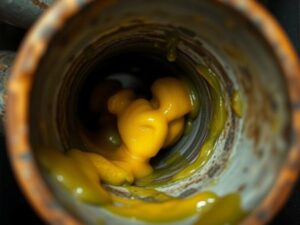
Many homeowners and restaurant owners in Houston, TX, believe that pouring hot water down the drain is an effective way to dissolve grease and prevent clogs. At first glance, this method seems logical—hot water melts grease, allowing it to flow through the pipes. However, this is a temporary illusion that can lead to severe plumbing issues down the line.
This article breaks down the science behind grease buildup, the hidden dangers of using hot water, and the right ways to handle grease disposal to prevent expensive repairs and ensure compliance with local regulations.
Why People Think Hot Water Works
The myth that hot water dissolves grease is based on a simple observation: when grease cools, it solidifies, and when heated, it turns into liquid. This leads many to assume that pouring hot water down the drain will wash away grease just like hot water removes oil from a frying pan.
While it’s true that hot water temporarily liquefies grease, it doesn’t actually remove it from the plumbing system. Instead, it moves the problem further down the pipes, where it can cause even worse blockages.
The Science of Grease and Hot Water
Grease, fats, and oils are hydrophobic, meaning they don’t mix with water. When you pour hot water down the drain, it melts the grease, making it appear to flow smoothly. However, as the hot water moves through the plumbing system, it begins to cool down. Once the water temperature drops, the grease solidifies again, coating the interior of pipes.
What Happens Next?
- Layered Buildup: Over time, grease sticks to the pipe walls and accumulates, trapping food particles and debris.
- Severe Blockages: This buildup restricts water flow, leading to slow drainage and eventually complete pipe blockages.
- Foul Odors: Trapped grease rots over time, creating unpleasant smells in the kitchen.
A simple analogy is melted butter in a cold pan—it remains liquid when hot but quickly solidifies as it cools. The same happens inside your plumbing.
The Hidden Consequences of Using Hot Water on Grease
1. Bigger Plumbing Issues Down the Line
While hot water may seem like a quick fix, it does not eliminate grease—it just moves it further along the pipes. Over time, this leads to costly blockages that require professional drain cleaning or even pipe replacement.
2. Risk of Sewer Line Damage
In commercial kitchens, grease that enters the municipal sewer system contributes to fatbergs—large, hardened masses of grease and debris that clog wastewater systems. Houston, like many cities, faces serious sewer blockages due to improper grease disposal.
3. Expensive Repairs and Legal Consequences
- Homeowners may face hundreds to thousands of dollars in plumbing repair bills.
- Restaurant owners risk fines for non-compliance with grease disposal laws in Houston.
The Right Way to Handle Grease Disposal
1. Never Pour Grease Down the Drain
Regardless of temperature, grease should never enter the plumbing system. Instead:
- Let grease cool and solidify, then dispose of it in the trash.
- Use a grease container or aluminum foil to collect excess fat.
2. Use Strainers in Sinks
Installing sink strainers helps catch grease, food particles, and debris before they enter the pipes.
3. Regularly Maintain Grease Traps
For restaurants and commercial kitchens, routine grease trap maintenance is legally required to prevent blockages and environmental hazards. Proper grease trap cleaning ensures that grease buildup does not become a major issue.
Houston-Specific Grease Disposal Regulations
Houston’s plumbing and waste management regulations require businesses to properly maintain grease traps and follow best practices for disposal. Failure to comply can result in fines, shutdowns, and environmental violations.
- Restaurants must install grease traps or interceptors.
- Grease traps must be cleaned regularly to prevent overflow and blockages.
- Improper grease disposal can lead to penalties from the City of Houston’s Public Works Department.
For homeowners, while there aren’t strict regulations, following proper grease disposal practices can prevent costly plumbing issues and help avoid sewer system blockages.
Why Professional Grease Trap Cleaning is the Best Solution
For commercial kitchens and food establishments, professional grease trap cleaning is the only way to ensure compliance and prevent costly clogs. Here’s why:
- Thorough Cleaning: Professionals remove all grease buildup, preventing future issues.
- Compliance with Local Laws: Ensures businesses meet Houston’s grease disposal regulations.
- Cost Savings: Regular maintenance prevents expensive repairs and sewer fines.
Final Takeaway: Hot Water is NOT a Solution for Grease
While hot water may seem like a quick way to dissolve grease, it does not eliminate the problem—it only moves it further down the pipes, leading to worse clogs and costly damage.
Instead of relying on ineffective methods, follow proper grease disposal practices and schedule regular grease trap maintenance to keep your plumbing system running smoothly.
For restaurant owners in Houston, investing in professional grease trap cleaning (https://draneranger.com/services/grease-grit-lint-traps/) is essential for compliance and long-term cost savings.
When it comes to grease management, prevention is always better than a costly repair.

 March 8th, 2025
March 8th, 2025  Arnold
Arnold 
 Posted in
Posted in 